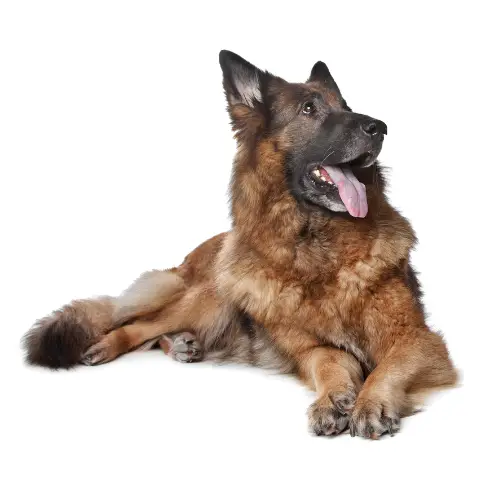German Shepherds are known for being intelligent, loyal, and protective dogs that make great companions for their owners. However, some owners may notice their German Shepherd groaning on occasion and wonder what could be causing this behavior. While it’s natural for dogs to vocalize, groaning can sometimes be a sign of an underlying health issue or discomfort. Understanding why your German Shepherd may be groaning can help you provide the best possible care for your furry friend. In this article, we will explore some of the common reasons why German Shepherds groan and what you can do to address any concerns.
Why do German Shepherds groan while sleeping?
German Shepherds, like many other dogs, may make noises while sleeping, including groaning, whining, and even barking. This is generally normal behavior and is nothing to worry about.
One possible explanation for why German Shepherds (and other dogs) groan while sleeping is that they are simply dreaming. Dogs experience a similar sleep cycle to humans, including periods of deep sleep where they may dream. During these dreams, dogs may make noises or move their bodies as if they are reacting to something in their dreams.
Another possible explanation is that groaning during sleep is simply a natural part of a dog’s respiratory system. As dogs breathe in and out, the air passing through their throat and airways can create sounds, including groaning or snoring. This is more likely to occur in dogs with shorter snouts or flat faces, such as Bulldogs or Pugs, but can still happen in German Shepherds as well.
Overall, as long as your German Shepherd is otherwise healthy and showing no signs of discomfort or distress, there is usually no cause for concern if they groan or make other noises while sleeping.
How can I tell if my German Shepherd is groaning because of pain?
Groaning in dogs can be a sign of pain, but it can also be a normal vocalization that they make when they are content or relaxed. It’s important to observe your dog’s body language and behavior in addition to their vocalizations to determine if they are experiencing pain or discomfort.
Some signs that your German Shepherd may be in pain include:
- Restlessness or agitation
- Loss of appetite
- Limping or favoring one leg
- Whimpering or crying
- Panting excessively
- Changes in posture, such as arching their back or standing with their legs wide apart
- Avoiding certain activities that they normally enjoy, such as playing fetch or going for walks
If you suspect that your German Shepherd is in pain, it’s important to take them to a veterinarian for an evaluation. Your veterinarian can perform a physical exam and diagnostic tests to determine the underlying cause of your dog’s discomfort and provide appropriate treatment.
Can diet be responsible for why my German Shepherd groans?
It’s unlikely that your German Shepherd’s groaning is directly related to their diet. However, it’s important to note that a dog’s diet can affect its overall health and well-being, which in turn can impact its behavior and physical characteristics.
If your dog is groaning or making other unusual noises, it could be a sign of discomfort or pain. There are many potential causes of discomfort in dogs, including gastrointestinal issues, joint pain, and other health problems. It’s important to consult with a veterinarian to rule out any underlying medical issues.
In addition to a proper medical evaluation, your veterinarian may recommend changes to your dog’s diet or exercise routine to help improve their overall health and well-being. A balanced and nutritious diet can help support your dog’s immune system, maintain a healthy weight, and promote healthy digestion, which can all contribute to their overall comfort and well-being.
What health problems can cause groaning in German Shepherds?
Groaning in German Shepherds can be caused by a variety of health problems. Some of the common health issues that may lead to groaning include:
- Arthritis: German Shepherds are prone to developing arthritis, a degenerative joint disease that causes inflammation and pain in the joints. This can result in groaning or vocalization when the dog moves or gets up.
- Hip dysplasia: This is a genetic condition that affects the hip joint and can cause pain and discomfort when the dog moves. Groaning can be a symptom of hip dysplasia.
- Back problems: German Shepherds are susceptible to back problems such as intervertebral disc disease (IVDD), which can cause pain and discomfort in the spine. This can lead to groaning or vocalization when the dog moves.
- Respiratory problems: If a German Shepherd is experiencing respiratory problems, such as asthma or bronchitis, it may groan or cough due to difficulty breathing.
- Digestive issues: If a German Shepherd is experiencing gastrointestinal issues such as bloating or constipation, it may groan or vocalize due to discomfort.
It’s important to note that groaning can also be a natural behavior for some dogs, especially as they age. However, if your German Shepherd is groaning excessively or seems to be in pain, it’s important to consult with a veterinarian to rule out any underlying health issues.
Can anxiety cause a German Shepherd to groan?
It is possible for anxiety to cause a German Shepherd to groan, although it is important to note that there may be other underlying reasons for this behavior as well. Groaning can be a sign of discomfort, pain, or stress in dogs, and anxiety can certainly cause stress.
When a German Shepherd is anxious, they may display a range of behaviors such as excessive panting, pacing, trembling, whining, and vocalizing. Groaning is a vocalization that may indicate that the dog is feeling uncomfortable or in distress. If you notice your German Shepherd groaning frequently or in certain situations, it may be a sign that they are experiencing anxiety.
However, it is important to rule out any medical causes for the groaning, such as pain or discomfort due to an underlying health condition. If you are concerned about your dog’s behavior, it is always a good idea to consult with a veterinarian or a certified dog behaviorist who can assess the situation and provide guidance on how to address your dog’s anxiety.
How can I help my German Shepherd stop groaning?
To help your German Shepherd stop groaning, you should first identify the cause of the issue. If the groaning is the result of an underlying health problem, your veterinarian can provide you with the best course of action. If the issue is dietary, you may need to change your dog’s diet or offer them supplements to help them feel more comfortable.
Conclusion
In conclusion, German Shepherds can groan for various reasons, including normal sleep patterns and underlying health issues. If you are concerned about your German Shepherd’s groaning, it’s best to consult with a veterinarian for a proper diagnosis and treatment. By changing your German Shepherd’s diet, providing a calm and comfortable environment, creating a routine, and addressing any underlying health issues, you can help your German Shepherd live a happy and pain-free life.







